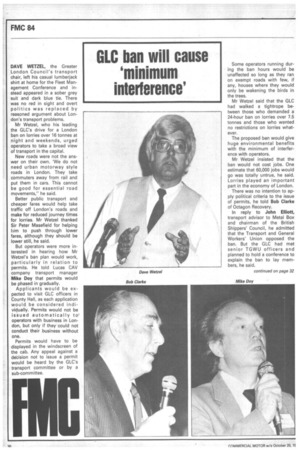GLC ban will cause 'minimum interference'
Page 32

If you've noticed an error in this article please click here to report it so we can fix it.
DAVE WETZEL, the Greater London Council's transport chair, left his casual lumberjack shirt at home for the Fleet Management Conference and instead appeared in a sober grey suit and dark blue tie. There was no red in sight and overt politics was replaced by reasoned argument about London's transport problems.
Mr Wetzel, who his leading the GLC's drive for a London ban on lorries over 16 tonnes at night and weekends, urged operators to take a broad view of transport in the capital.
New roads were not the answer on their own. 'We do not need urban motorway style roads in London. They take commuters away from rail and put them in cars. This cannot be good for essential road movements," he said.
Better public transport and cheaper fares would help take traffic off London's roads and make for reduced journey times for lorries. Mr Wetzel thanked Sir Peter Masefield for helping him to push through lower fares, although they should be lower still, he said.
But operators were more interested in hearing how Mr Wetzel's ban plan would work, particularly in relation to permits. He told Lucas CAV company transport manager Mike Doy that permits would be phased in gradually.
Applicants would be expected to visit GLC officers in County Hall, as each application would be considered individually. Permits would not be issued automatically to' operators with business in London, but only if they could not conduct their business without one.
Permits would have to be displayed in the windscreen of the cab. Any appeal against a decision not to issue a permit would be heard by the GLC's transport committee or by a sub-committee. Some operators running during the ban hours would be unaffected so long as they ran on exempt roads with few, if any, houses where they would only be wakening the birds in the trees.
Mr Wetzel said that the GLC had walked a tightrope between those who demanded a 24-hour ban on lorries over 7.5 tonnes and those who wanted no restrictions on lorries whatever.
The proposed ban would give huge environmental benefits with the minimum of interference with operators.
Mr Wetzel insisted that the ban would not cost jobs. One estimate that 60,000 jobs would go was totally untrue, he said. Lorries played an important part in the economy of London.
There was no intention to apply political criteria to the issue of permits, he told Bob Clarke of Octagon Recovery.
In reply to John Elliott, transport advisor to Metal Box and chairman of the British Shippers' Council, he admitted that the Transport and General Workers' Union opposed the ban. But the GLC had met senior TGWU officers and planned to hold a conference to explain the ban to lay members, he said.
































































































































































































































